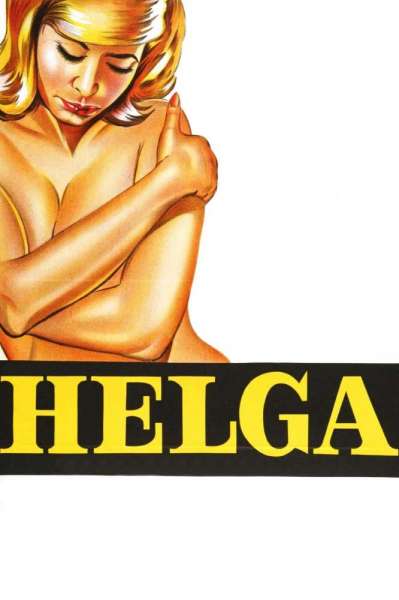Helga is a Allemand film of genre Drama
Helga (1967)
Helga – Vom Werden des menschlichen Lebens

If you like this film, let us know!
Helga – Vom Werden des menschlichen Lebens (English: Helga – On the Origins of Human Life, lit. On the development of human life) is a 1967 West German sex education documentary and the first film of the Helga trilogy. Its release in West Germany was followed by international releases to many European countries, the British Commonwealth and the United States. It became one of the greatest box-office successes of West German cinema, viewed by forty million people in West Germany and internationally. In the first months of its showing in West Germany the audience had reached four million people. The film featured scenes of childbirth which were the first to be shown publicly in Germany. Helga was the first in a series of educational films which were considered "relatively permissive" at the time. The film was considered a part of an "enlightenment wave" which was undertaken by the West German Federal government at the time. In 1968, in France, the film was viewed by five million people. In Grenoble alone it is reported that 60,000 viewers had seen it in the first days of its screening, out of a population of 150,000. In Tours, the film played to full-houses for three consecutive weeks. The film used animation, stock footage and microphotography to depict the stages of life from conception to childbirth.
Synopsis
Le film raconte la vie intime d'Helga, une jeune femme allemande. Inexpérimentée, elle veut se marier. Un gynécologue lui parle des rapports sexuels et du contrôle des naissances. Elle tombe enceinte et assiste à un cours pour les futures mamans. La naissance de son premier bébé est montrée en détails. Elle est une mère heureuse et donne naissance à trois autres enfants.Comments
Leave comment :
Suggestions of similar film to Helga
There are 69758 with the same cinematographic genres (including 1041 with exactly the same 2 genres than Helga), 7389 films with the same themes (including 244 films with the same 2 themes than Helga), to have finally 70 suggestions of similar films.If you liked Helga, you will probably like those similar films :

After Tiller (2013)
, 1h27Origin USA
Genres Drama, Documentary
Themes Pregnancy films, Films about sexuality, Documentaire sur une personnalité, Documentary films about health care
Rating73%





The film follows the daily work and lives of doctors LeRoy Carhart, Warren Hern, Shelley Sella, and Susan Robinson, the only four doctors in the United States who openly perform late-term abortions after the 2009 assassination of Dr. George Tiller.

I Am (2011)
, 1h35Directed by Onir
Origin Inde
Genres Drama, Documentary, Adventure, Romance
Themes Films about children, Pregnancy films, Films about music and musicians, Films about sexuality, LGBT-related films, Films about pedophilia, Musical films, Bollywood, LGBT-related films, LGBT-related film
Actors Juhi Chawla, Manisha Koirala, Nandita Das, Rahul Bose, Sanjay Suri, Manav Kaul
Rating67%





"Afia" - A single woman (Nandita Das) decides to become a mother using a sperm donor.

Absolute Strangers (1991)
Directed by Gilbert Cates
Genres Drama, Documentary
Themes Pregnancy films, Films about sexuality
Actors Henry Winkler, Patty Duke, Richard Kiley, Audra Lindley, Karl Malden, Jennifer Hetrick
Rating58%






God's Offices (2008)
, 2h2Directed by Claire Simon
Origin France
Genres Drama, Comedy, Comedy-drama, Documentary
Themes Feminist films, Pregnancy films, Films about sexuality, Films about the labor movement
Actors Anne Alvaro, Michel Boujenah, Nathalie Baye, Rachida Brakni, Isabelle Carré, Lolita Chammah
Rating62%





Au Planning Familial, les femmes se racontent : Djamila aimerait prendre la pilule parce que maintenant avec son copain c’est devenu sérieux, la mère de Zoé lui donne des préservatifs mais elle la traite de pute, Nedjma cache ses pilules au-dehors car sa mère fouille dans son sac, Hélène se trouve trop féconde, Clémence a peur, Adeline aurait aimé le garder, Margot aussi.

These Wilder Years (1956)
, 1h31Directed by Roy Rowland
Origin USA
Genres Drama
Themes Films about adoption, Films about children, Films about families, Pregnancy films, Films about sexuality
Actors James Cagney, Barbara Stanwyck, Walter Pidgeon, Tom Laughlin, Betty Lou Keim, Don Dubbins
Rating67%





Businessman Steve Bradford (James Cagney) looks for his illegitimate son after 20 years. He turns to Ann Dempster (Barbara Stanwyck), who runs an orphanage, but she is uncooperative.

The Marriage of Maria Braun (1979)
, 2hDirected by Rainer Werner Fassbinder
Origin German
Genres Drama, War
Themes Pregnancy films, Films about sexuality, Political films, Films about marriage
Actors Hanna Schygulla, Klaus Löwitsch, Gisela Uhlen, Ivan Desny, Gottfried John, Rainer Werner Fassbinder
Rating76%





The film starts in Germany in 1943. During an Allied bombing raid Maria (Hanna Schygulla) marries the soldier Hermann Braun (Klaus Löwitsch). After "half a day and a whole night" together, Hermann returns to the front. Postwar, Maria is told that Hermann has been killed. Maria starts work as a hostess in a bar frequented by American soldiers. She has a relationship with an African-American soldier Bill (George Byrd), who supports her and gives her nylon stockings and cigarettes. She becomes pregnant by Bill.

Apio Verde (2013)
, 1h22Genres Drama, Thriller, Horror
Themes Pregnancy films, Films about sexuality
Actors Teresita Reyes
Rating24%





A couple is told their child has a disease that won't allow him to live outside the mother's womb. It won't matter how much physical or mental pain they feel; as therapeutic abortion is illegal on Chile, they'll have to wait until the natural birth.

Party Monster (2003)
, 1h39Origin USA
Genres Drama, Biography, Comedy, Documentary, Crime
Themes Medical-themed films, Films about music and musicians, Films about drugs, Films about sexuality, LGBT-related films, Musical films, LGBT-related films, LGBT-related film
Actors Macaulay Culkin, Seth Green, Chloë Sevigny, Wilmer Valderrama, Diana Scarwid, Dylan McDermott
Rating61%





Based on the book Disco Bloodbath, by James St. James, the film opens with Michael Alig as a small-town outcast who lived with his mom before moving to New York. Michael learns the New York party scene from James St. James, who teaches him the "rules of fabulousness", which mostly revolve around attracting as much attention to oneself as possible.

Quinceañera (2006)
, 1h30Directed by Richard Glatzer
Origin USA
Genres Drama
Themes Pregnancy films, Films about music and musicians, Films about sexuality, LGBT-related films, Hip hop films, Gangster films, LGBT-related films, LGBT-related film
Actors Emily Rios, Jesse Garcia, Alicia Sixtos
Rating68%





Magdalena, a fourteen-year-old girl from a working-class Mexican American family in Echo Park, Los Angeles, attends her cousin Eileen's quinceañera, an extravagant coming-of-age ceremony to celebrate her fifteenth birthday. Eileen's older brother Carlos—who has been disowned by his family due to his homosexuality and now lives with his great-uncle Tomas—arrives at the celebrations but is forced to leave by his father. Magdalena herself is about to turn fifteen but her parents cannot afford to host a quinceañera as lavish as Eileen's, and they deny her repeated requests to hire a Hummer limousine for the occasion. While preparing for her quinceañera, Magdalena learns that she is pregnant by her friend Herman although they had only once engaged in non-penetrative intercourse. Her Christian father is furious, believing that Magdalena has had premarital sex despite her protestations that she is still a virgin. She leaves her family to move in with Tomas and Carlos and continues to see Herman until she discovers that his mother has sent him away to live with relatives to prevent him from seeing Magdalena.

Wish You Were Here (1987)
, 1h32Directed by David Leland
Origin United-kingdom
Genres Drama, Comedy, Comedy-drama, Romance
Themes Pregnancy films, Films about sexuality
Actors Emily Lloyd, Tom Bell, Heathcote Williams, Jesse Birdsall, Geoffrey Hutchings, Charlotte Barker
Rating67%





Sixteen-year-old Lynda Mansell (Emily Lloyd) lives in a small English seaside town in the early 1950s. She is feisty and precocious and tries to shock other people with her vulgar and saucy tongue (her favourite insult is "Up yer bum"). Bored with conventional jobs (which she frequently loses) and her town's dull young men, Lynda has her first sexual experience with Dave (Jesse Birdsall) but after she has slept with one of her father's middle-aged friends (Tom Bell), her life changes. She becomes pregnant and her father, a somewhat rigid and conventional man, disowns her. Desperately she tries to seek an illegal abortion but in the end decides to become a mother.
 Connection
Connection